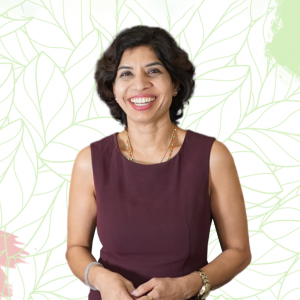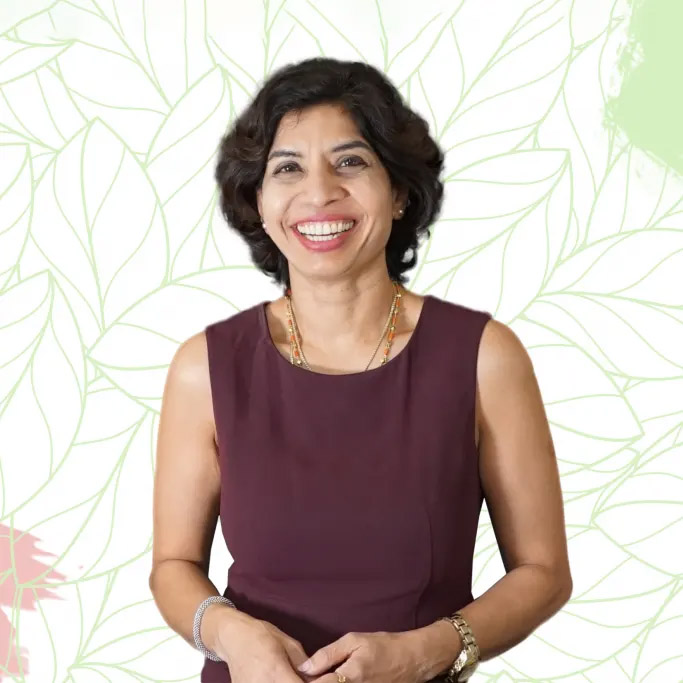
10 Menopause Myths
We all want to live long, happy lives. It’s a pretty universal desire.
Growing into our older bodies is a gift that many are not afforded. However, for some women, aging can be accompanied by the discomforts and uncertainties of menopause.
This can be a difficult stage of life. It can also be extremely transformative.
Menopause is turning the page to a new chaper – a chapter to grow in wisdom, experience, and to become a better version of yourself.
While it can feel overwhelming, it doesn’t have to be! There is a lot of misinformation, and we’re here to clear up the ten biggest menopause myths. We’ve consulted with some of the greatest experts in the field of women’s health to help you along this next phase of life.
For more expert insight, check out our podcast with the brilliant Dr. Nitu Bajekal, a gynaecologist with thirty-five years of experience empowering women to take charge of their health.

1. Miserable menopause symptoms are a guarantee.
Hot flushes, low libido, irritability, brain fog… These are just some of the joys of menopause. Believe it or not – it doesn’t have to be this way!
Menopause can be a beautiful period in one’s life. A time for new beginnings, fresh starts, and a new you. With the proper support and healthy lifestyle changes, misery in menopause does not have to be your reality.
Proper guidance in movement, sleep, and nutrition can significantly decrease those hormonal fluctuations and discomforts. A plant-based diet can support optimal health in all stages of life. These easy vegan tacos are low fat and packed with protein and fibre.
2. Menopause starts after the age of fifty.
Wouldn’t it be nice if menopause were that predictable? Unfortunately, this isn’t the case. Menopause runs on it’s own clock – not yours.
While the average age of menopause is fifty-one, the average range of menopause falls between forty-five and fifty-five years old for women across the world.
Early menopause occurs when a woman’s period stops between the ages of forty and forty-five. In approximately one percent of cases, menopause can start before the age of forty. This is known as premature ovarian insufficiency, or POI.
The average life expectancy of a woman in the UK is just under eighty-three years. Therefore, women can hopefully expect to live thirty plus years after menopause.
This period is extremely important and can include some of the happiest and most productive years of an individual’s life. For more tips and science on ageing well, be sure to listen to our podcast episode with Dr. James Timmons.
3. Menopause starts when your period stops.
Not quite. Menopause occurs when the number of eggs in the ovaries drop to a critical level where periods stop. However, a woman is only considered menopausal or post-menopausal when they have not had any periods or bleeding for at least twelve months.
As you can imagine, this can be confusing. If your periods have stopped for any reason, or if your bleeding patterns suddenly change, you should always consult your doctor for advice.
Many women assume that they cannot get pregnant as they approach perimenopaus or menopause. However, this is not the case.
If your periods have stopped before the age of fifty, you should continue to use effective contraception for at least two years after your last period. If you are over the age of fifty, it is recommended you use contraception for at least one year after your last menstrual period.
4. Symptoms are normal and there’s no reason to seek help.
Unfortunately, many women persist in their discomfort with symptoms of menopause because they believe their experience is ‘normal.’ Studies have shown that eight out of ten women suffer from significant hot flushes, yet only two to three will seek help.
Even fewer individuals seek help for symptoms of painful sex. While this may be for a number of reasons, it is important that individuals experiencing menopausal symptoms advocate for themselves to receive the most appropriate and effective supports.
While menopause is guaranteed. Significant discomfort does not have to be. Be sure to connect with your doctor, as well as certified nutrition experts and lifestyle practitioners to promote the most optimal health and reduce uncomfortable symptoms.
5. Weight loss is impossible during menopause.
Hormonal fluctuations in perimenopause and menopause, sleep disturbances, increased anxiety, and stress can make it easier to put on weight and more challenging to lose it.
Most adults ten to steadily put on weight between the ages of twenty and sixty-five, with women in early menopausal years often noticing unwanted weight gain.
While managing weight in menopause can be challenging, it is definitely not impossible. Eating a whole food, plant-based diet, moving your body, and prioritising your sleep can not only prevent chronic disease, but it can help you maintain a healthy weight.
Developing ways to reduce using oil while cooking can help to keep weight off in menopause. For example, saute and cook in water or vegetable broth. These easy, cheesy enchiladas are oil-free and sacrifice no flavour!
Any diet is destined to fail long-term if not a part of a healthy, sustainable lifestyle with realistic goals and a positive mindset. Repeat an affirmation out loud at least five to ten times per day. Let the words that leave your mouth be both kind and true. Be patient with yourself and take a step toward change.
6. Your sex life is over.
Low sexual desire, low libido, and vaginal changes are all symptoms of menopause. However, these changes do not mean that your sex life has to suffer.
Between 17-45% of postmenopausal women report finding sex painful. This is likely due to falling hormone levels which can cause vaginal atrophy, or thinning of the lining of the vagina.
Not to fear. There is still plenty to do to improve vaginal lubrication and comfort during sex.
Women should try to avoid: excessive washing, douching, using perfumed toiletries, feminine wipes and synthetic perfumes. Natural oils such as coconut oil, Vitamin E, or almond oil after a shower can help to lock in moisture around the vulval area. Water-based vaginal moisturizers and lubricants help make sexual intercourse more comfortable.
Most importantly – take charge of your diet and lifestyle! Eating whole plant foods, such as soybeans, watermelon, and lots of veg can help to improve the vaginal microbiome.
During menopause, many women feel a loss. They may feel more fatigued or just not like themselves. Having said that, menopause can also be liberating for many. It’s a time when one is often more secure, confident, and can ask what they want sexually.
The most important factor is to remain open and patient throughout this stage, communicate openly with your sexual partner, and seek support together if needed. For more on sexual longevity, check out our fascinating conversation with Dr. Amy Killen.
7. It’s too late for lifestyle changes.
The earlier you incorporate dietary and lifestyle changes, the more benefits you are likely to see. That said, it is never too late to start making changes. These changes can help manage symptoms of menopause and live a happier and more fulfilling life.
Approximately 80% of what health professionals are seeing today is related to lifestyle. Nutrition, exercise, sleep, alcohol use, stress and loneliness all play key roles in chronic disesase, as well as women’s health issues such as menopause.
A fibre-rich plant-based diet, combined with a healthy exercise routine, good sleep hygience, mindfulness, and having positive social connections can go a long way in combating menopausal symptoms.
Additionally, many women find the time around menopause stressful. It is so important to take care of your own needs during this stage of life, especially when these needs may have been put on the back burner for so long.
Self-care can include deep breathing, walking in nature, or a long bath. It could involve setting healthy boundaries with others. Build your self-care toolbox.
Don’t forget to have fun, too! Cultivate a sense of curiosity, fun, and light heartedness in your life. These small changes support optimal health in menopause and beyond.
8. Soy products will disrupt your hormones further.
The soybean is a legume that has been around for thousands of years. Despite the various opinions and misconceptions, it is not only safe but optimal for your health.
Adopting plant-based diets rich in legumes including beans, lentils and peas, and especially soy helps reduce menopausal symptoms in two ways.
First, soy is a rich source of plant oestrogens or natural phytoestrogens. These can help to reduce both hot flush incidence and severity. Second, soy can help to promote a happy weight. Excess body weight is associated with a higher incidence of symptomatic hot flushes.
Soy also helps to reduce the risk of heart disease, lowers cholesterol levels, reduces the risk of breast, bowel, liver, and ovarian cancers and reduces the risk of osteoporosis.
Two to four daily portions of minimally processed soy products, such as soy milk, soy yoghurt, edamame beans, mature soybeans, tofu, miso, and tempeh is recommended by experts.
A randomised controlled trial suggested fantastic results. Only a half cup of mature soya beans reduced the frequency and severity of hot flushes by 84% and improved the quality of life in vasomotor, psychosocial, physical, and sexual symptoms in postmenopausal women when followed for only twelve weeks.
Don’t be afraid to add soy to your diet! It’s incredibly healthful and can reduce your risk of chronic disease, in addition to supporting menopausal symptoms. Check out our favourite ways to cook tofu for amazing texture and flavour!
9. A plant-based diet can’t meet your protein needs.
Many experts believe that protein needs are higher as we get older. The current recommendation is that individuals ages sixty five and older aim for a daily protein intake of at least 1-1.2g per kg of body weight.
There seems to be a common misconception that you can’t get enough protein without consuming animal products. This is simply untrue.
By eating a wide variety of plant foods with a focus on protein rich foods, such as legumes, you can easily meet protein recommendations. Nearly all vegetables, legumes, grains, nuts, and seeds contain some protein. Protein is made up of amino acids and plants contain all nine amino acids, much to contrary belief.
Replacing some grains in your diet with beans is one way to increase your protein intake. By focusing on two to four servings of soy products per day, such as tofu, tempeh, and soy milk, you can easily achieve higher protein recommendations during menopause.
You can thrive on a plant-based diet at all stages of life. Check out this delicious, high protein bowl for a super tasty meal.
10. Your body is failing you.
Menopause can certainly come with challenges, but it can also be accompanied by great wisdom and experience. A new you is emerging, and it’s time to embrace those changes.
Our most productive and enjoyable years are often after menopause. We can take time to pursue the things we’re passionate about. We can be of great help to our families and our greater community.
If you feel yourself slipping into a negative space, try incorporating some positively worded statements, or affirmations, in your day. Studies have shown that these can decrease stress and increase well-being. They can strengthen self-worth and ensure you practice kindness and compassion toward yourself.
Menopause – A New Beginning
While menopause can certainly signify a conclusion to one chapter of life, it also represents a new chapter and beginning to be enjoyed.
There is a beautiful life to be lived during and after menopause, and we encourage you to take control of your health and happiness to make it your best years yet.
If you’re craving community connection, access to expert advice, exercise, movement, and mindfulness, along with over 600 delicious plant-based recipe – be sure to join our Happy Menopause Course!









